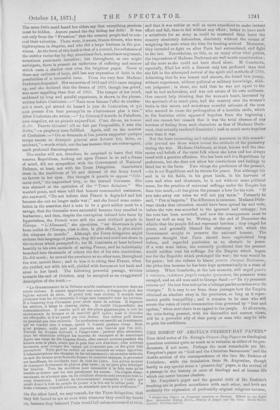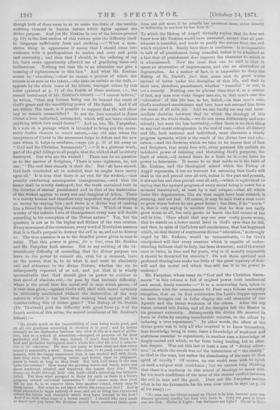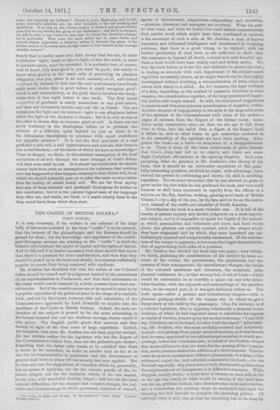THE BISHOP OF ARGYLL'S PRESENT-DAY PAPERS.* Tura third series of
Dr. Ewing's Present-Day Papers on theological questions contains quite as much as is valuabie as either of its pre- decessors, if not more. Perhaps the most remarkable are Mr. Farquhar's paper on "God and the Christian Sacraments" and the double section of the correspondence of the late Mr. Erskine of Linlathen ; while the translation from St. Augustine, though hardly in any special sense a present-day' paper, is the revival of a passage in the history at once of theology and of human life which can never become obsolete.
Mr. Farquhar's paper and the general drift of Mr. Erskine's teaching are in perfect accordance with each other, and both are evidently the expression of profoundly original religious natures,
* Present-Day Papers on Prominent Questions in Theology. Edited by the Right Rev. Alexander Ewing, D.C.L., Bishop of Argyll and the isles. Third Series. London: Strahan and Cu.
though both of them seem to us to make too little of the terrible resisting element in human nature which fights against the divine purpose. And yet Mr. Erskine in one of the letters printed (p. 59) is the first section of this volume puts the difficulty itself in language sufficiently fresh and striking ;—" What a mon- strous thing in appearance it seems that I should come into existence with a predisposition to malice and envy and pride and sensuality ; and then that I should, in the ordering of my lot, have every opportunity afforded me of gratifying these evil inclinations. Nothing but that life is an education can give a meaning of righteousness to this fact." And what Mr. Erskine means by 'education,'—that he means a process of which the success is as sure as the intent,—the issue as certain as the drift,— appears by the whole tenor of hie letters, amongst others by this letter (printed at p. 71 of the fourth of these sections, i.e., the second instalment of Mr. Erskine's letters) :—" I cannot believe," he writes, "that any human being can be beyond the reach of God's grace and the sanctifying power of His Spirit. And if all
are within His reach, is it possible to suppose that He will allow any to remain unsanctified ? Is not the love revealed in Jesus Christ a love unlimited, unbounded, which will not leave undone anything which love could desire? " And so, too, Mr. Farquahar, he a note on a passage which is intended to bring out the neces- sarily double element in man's nature,—the old man whom the acceptance of Christ in the sacrament helps to defeat and the new man whom it helps to reinforce,—says (at p. 47 of his essay on " God and the Christian Sacraments") :—" It is a glorious truth, part of the glad tidings to all people, that the wicked shall be utterly destroyed. But who are the wicked ? There can be no question as to the answer of Scripture, ' There is none righteous, no, not one ; " The soul that sinneth it shall die.' But all have sinned. God hath concluded all in unbelief, that he might have mercy upon all.' It is true that there is no rest for the wicked,—that penalty everlasting accompanies transgressions,—and that the sinner shall be utterly destroyed; but the truth contained both in the doctrine of eternal punishment and in that of the destruction of the wicked applies to every son and daughter of Adam. There is a merely human and therefore very imperfect way of destroying an enemy by slaying him and there ie a divine way of making him a friend by destroying the enmity in him. Which of these is worthy of the infinite Love of Omnipotence every man will decide according to his conception of the Divine nature." Yes, but the question is not as to the higher and diviner of the two courses. Every movement of the conscience, every word of Revelation assumes that it is God's purpose to destroy the evil in us, and not to destroy us. The true question is as to the dreadful power given to man to resist. That this power is given, for a time, even Mr. Erskine and Mr. Farquhar both assume. But to say nothing of the ex- traordinary difficulty of conceding that the divine purpose can leave us the power to commit sin, even for a moment, leave us the power, that is, to do what is and must he absolutely evil and abhorrent to the divine Nature, whether the sin be subsequently repented of or not, and yet that it is wholly inconceivable that God should give us power to continue in
that mood of absolute evil,—to pass by that intrinsic difficulty, where is the proof that the moral evil in man which grows,—if it ever does grow,—against God's will, shall with moral certainty be ultimately annihilated without the destruction of the very nature in which it has been thus making head against all the countervailing tide of divine grace ? The Bishop of St. Davids (Dr. Thirl wall) putt; the difficulty with great force (p. 9 of the fourth section of this series, the second instalment of Mr. Erskine's letters) :-
e He dwells much on the impossibility of man being made good, and on all our goodness consisting in choosing to be good : and he insists strongly on the distinction between the view of life as a state of proba- tion, and as a school of education—designed to prepare all fer final perfection and bliss. He says, indeed, 'I don't deny that there is a trial and probation throughout man's whole life—but the trial is subserv- ient to the education.' He does not seem to have observed that every school is essentially a trial. Some, who choose to be good, come out like himself, with the happy experience that it has worked well with them, that they have been growing better and better, riper in judgment, purer in heart, as long as they lived. But with how many is the case quite the reverse ! How many are growing worse and worse, more and more hardened, blinded, and depraved, the longer they live! With these—no doubt through their own fault—God's schooling has hitherto failed. But then what prospect is there for such as these in a future progress toward universal restoration ? God cannot make them good. All he can do is to remove them into another school, which may fit them better. But must he not know which fits every one best ? And is their education to begin entirely de novo, and not to bring into the second school the habits and character which they have formed in the first? And if so, with what hope of a better result ? I should like very much to know bow you think Mr. Erskine would have answered these ques-
tions, and still more, if he actually has answered them; either directly or indirectly, to see how he has done it.' "
To which the Bishop of Argyll virtually replies that he does not know how Mr. Erskine would have answered, except that all pun- ishment is remedial, and tends to purify the nature from the evil which required it. Surely here there is confusion. It is impossible to talk of all punishment being remedial, unless it be admitted as a fact that all punishment does improve the character to which it is administered. Now the most that can be said is thet it opens an alternative of improvement, and also an alternative of degeneration. As a matter of fact, it is impossible to deny the Bishop of St. David's ,fact that some men do grow worse instead of better under the discipline of this life, and that in their case, therefore, punishment, whether " remedial " or not, is not a remedy. Nothing can be plainer than that if, as a matter of fact, any man ever sinks deeper into sin, in that man's case the ' education' of this life has, so far, failed,—in that man's case,
God's combined omniscience and love have not rescued him from the worst of all evils, sin. And we can hardly see any real inter-
mediate doctrine between that to which the theology of this volume on the whole tends,—we do not mean deliberately and con- sciously, but none the less inevitably,—that there is no such thing as any real moral retrogression in the soul of man,—that all history and life, both national and individual, must chronicle a steady progress upwards, which is the result of the divine love and edu- cation,—and the doctrine which we take to be nearer that of fact and Scripture, that every free-will, every personal life enfolds an indefinite power of resisting and thwarting God's purposes, the limit of which,—if indeed there be a limit to it,—we have no power to determine. It seems to us that noble as is the faith of Mr. Erskine, and the theological school which the Bishop of Argyll represents, it has no warrant for assuming that God's will shall in the end prevail over all evil, unless in the past and present, it always has and does prevail over all evil,—which is equivalent to saying that the upward progress of every moral being is never for a moment interrupted, at least by a real relapse,—that all which looks like degeneration, like sin that might have been resisted, is seeming, and not real. Of course, it may be said that a man needs to grow worse before he can grow better; but then, if he "needs " it, that is only saying in another form that he does not really grow worse at all, but only grows to know the full extent of the evil in him. Once admit that any one ever really grows worse, that he stands on a lower moral level in God's eyes than he did, and then, in spite of God's love and omniscience, that has happened which, on that theory of continuous divine " education," so strongly urged by Mr. Erskine, would be inconceivable, for God's omnipotent will that every creature which is capable of under- standing holiness shall be holy, has been thwarted; and if thwarted once or twice, in time and for years, why is it morally impossible it should be thwarted for eternity? Do not those spiritual and profound theologians make too little of the great mystery of free- will and the moral evil which free-will has it in its power to
embrace?
Mr. Farquhar, whose essay on " God and the Christian Sacra- ments" in this volume is full of original power, both intellectual and moral, finely remarks :—" It is a noteworthy fact, taken in connection with the consequences St. Paul says follows unworthy
reception, that on its first celebration the Lord's Sapper appears to have brought out in fuller display the evil character of one Apostle and the latent weakness of the others. After the sop Satan entered into Judas, and all the disciples left the Master in his greatest extremity. Subsequently the divine life asserted its force in Judas by causing unendurable remorse, in the others by inducing a true repentance." In other words, the effect of the divine grace was to help all who received it to know themselves, that knowledge being in some cases a knowledge of weakness and sinfulness essential to repentance, in another case a knowledge of deeply-rooted evil which, so far from being healing, led to abso- lute despair. Was not this last at least it case of " divine educa- tion" in which the result was not the destruction of " the enmity" to God in the man, but rather the abandoning of the man to that spirit of enmity ? Of course, no one could even wish to speak on such a subject with confidence ; but we cannot help thinking that there is a tendency in this school of theology to speak with far too much confidence of the issue of the eternal conflict between the evil in man and the good. Does not Mr. Farquhar assume what is far too favourable for his own view when he says (at p. 56 of his essay) " No man can see Christ except as Christ is in him, because none can discern spiritual quality but they who have it. Only the pure in heart can sea God. Christ is Light: can darkness see light? Christ is Hull- nese.: can impurity see holiness ? Christ is Love, Meekness, and Lowli- ness ; and such qualities are for ever invisible to the self-seeking and ambitions. It is only as the Christ-nature is formed and grows within man that he can behold the glory of the Redeemer ; and whop so formed, he will be able to see Christ in any man in whom the Christian charac- ter is perfected, That oven the most sinful can in some feeble and remote degree appreciate a virtuous action, is because the germ of the divine nature is in every man, though more or less buried in the corrupt deathly nature."
Sorely that is hardly more true than to say that the eye, in order to perceive light,' must be akin to light, or that the mind, in order to perceive space, must be extended. It is perfectly true, of course, that to know fully what good is, you must be good ; but surely to know what good is in the sense only of perceiving its absolute obligation over you, there is no such necessity at all, and indeed mad not be, because in that case the soul must already have freely made some choice that is good before it could recognize good ; which is self-contradictory, as the good choice involves the recog- nition that it was right before it was made. The first moral recognition of goodness is surely antecedent to any good action, and does not necessarily involve any real life in Christ. The eye recognizes the light and its intrinsic right to our allegiance before either the light or the darkness is chosen ; but it is only as one or the other is chosen that we become good or evil, is there not too much tendency in the theologians before us to presume one solution of a difficulty quite beyond us, just as there is in the Athanasian theologians to presume with equal confidence the opposite solution ? Is it not the first postulate of a real good and a real evil, a real righteousness and real sin, that there is also a real freedom,—of the limits of which we have no knowledge? There is danger, we think, in this absolute assumption of the final extinction of all evil through the mere triumph of God's divine will that none shall be lost. It is almost inevitable that we should reason back from such an assumption to the inference that nothing ever has happened or does happen contrary to that divine will, from which we should naturally pass on to infer the mere seeming rather than the reality, of actual moral evil. We are far from saying that any of those eminent and profound theologians do incline to this conclusion ; but it is the natural logical issue of the language they ofter use, and tends, we think, to a result utterly fatal to the deep moral basis from which they start.




































 Previous page
Previous page